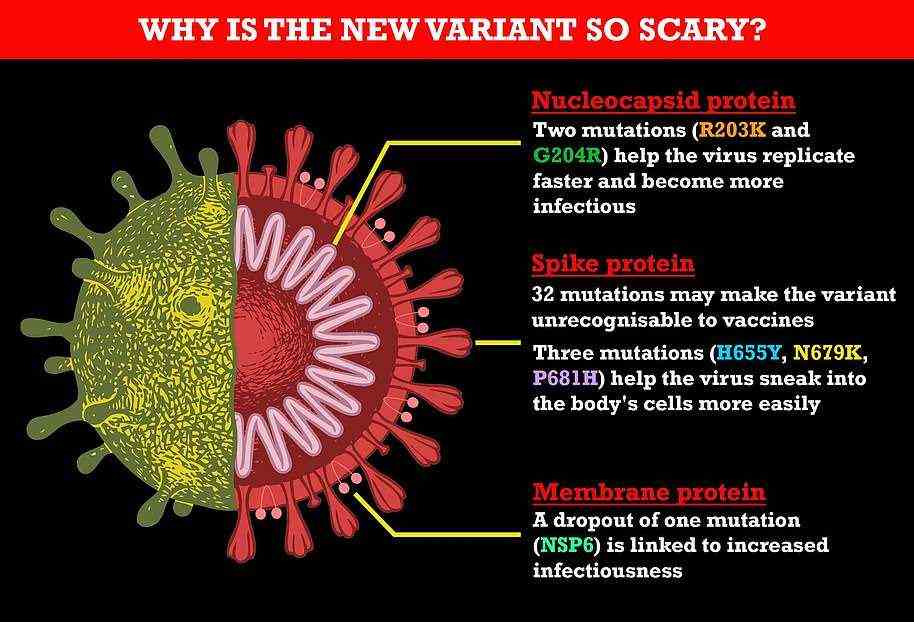The White House on Sunday called on people to get their booster shots as a matter of urgency, as the new variant Omicron was confirmed to have arrived in North America.
Joe Biden returned from his Thanksgiving break to hold an emergency meeting with his COVID advisors on Sunday evening – with Dr Anthony Fauci warning that it will be two weeks until the new variant, Omicron, is fully understood, and that he believed ‘existing vaccines are likely to provide a degree of protection against severe cases’ from the mutant super-strain.
Two cases of Omicron were confirmed in Canada on Sunday – both in patients in the capital, Ottawa, who had traveled to Nigeria. Nigeria is not on the list of countries affected by Biden’s travel ban, announced on Friday, which came into effect at 12:01 ET on Monday.
Further updates on those patients’ conditions have not been shared.
Upon returning from Massachusetts, Biden was asked whether he was considering additional travel restrictions.
‘I’m having a meeting with my medical team as I get back to the White House. I’ll have more to say,’ he said.
The White House then issued a photo of Biden sitting in the Oval Office with Fauci, his chief medical advisor; his chief of staff, Ron Klain; Jeff Zients, White House Coronavirus Response Coordinator; and two others.
Joe Biden is seen on Sunday in the Oval Office with his chief of staff, Ron Klain (far right), Anthony Fauci (center) and the White House coronavirus coordinator, Jeff Zients (second from left)



‘Following up on the regular briefings he had on COVID while traveling, the President met in person today with his Chief Medical Advisor, Dr. Anthony Fauci, and members of his White House COVID Response Team on the latest developments related to the Omicron variant,’ the White House said.
‘Dr. Fauci informed @POTUS that while it will take approximately two more weeks to have more definitive information on the transmissibility, severity, and other characteristics of the variant, existing vaccines are likely to provide a degree of protection against severe cases.
‘Dr. Fauci also reiterated that boosters for fully vaccinated individuals provide the strongest available protection from COVID. The COVID Response Team’s immediate recommendation to all vaccinated adults is to get a booster shot as soon as possible.’
Yet despite the White House’s concern, there are no new rules on testing before or after travel.
Airline passengers entering the United States from abroad must prove that they are vaccinated before they board, but are not generally monitored by health officials after they leave flights and are not required to take a COVID-19 test upon arrival in the United States.
Americans do not need to be vaccinated to return home, but they must usually provide a negative COVID test, taken no more than 72 hours before, to fly.
Americans can still fly from the ‘banned’ countries.

The recommendation to get booster shots comes as Canada confirmed the first North American case of Omicron.
‘Today, the province of Ontario has confirmed two cases of the Omicron variant of COVID-19 in Ottawa, both of which were reported in individuals with recent travel from Nigeria,’ said Christine Elliott, deputy premier and minister of health, and Dr. Kieran Moore, chief medical officer of health.
‘Ottawa Public Health is conducting case and contact management and the patients are in isolation.’
Canada, like the U.S., has banned travel from South Africa – which has the largest number of cases – and seven regional countries.
But Nigeria is not one of the countries on the banned list.
Eric Feigel-Ding, an epidemiologist, told DailyMail.com on Friday that he believed the new variant was ‘probably worldwide’ already.
A patient in Belgium who tested positive – the first in Europe – had not been in sub Saharan Africa. She had traveled to Egypt via Turkey, and tested positive for Omicron on her return.
‘The best defense against the omicron variant is stopping it at our border,’ said Elliott and Moore.
‘In addition to the measures recently announced, we continue to urge the federal government to take the necessary steps to mandate point-of-arrival testing for all travelers irrespective of where they’re coming from to further protect against the spread of this new variant.’
The provincial government urged residents to get vaccinated, including with booster doses, and to continue following public health guidance.
‘Ontario is prepared and ready to respond to this new variant.’
Canada’s health minister said that the swift-identification of the variant showed that their testing system was working.
‘As the monitoring and testing continues with provinces and territories, it is expected that other cases of this variant will be found in Canada,’ said Jean-Yves Duclos.

Today it’s back to business for the first family – a White House official said earlier on Sunday that Joe Biden will be briefed by his medical advisers on the concerning new COVID Omicron variant

Biden and his family returned to Washington aboard Air Force One on Sunday afternoon after their traditional Thanksgiving holiday in Nantucket
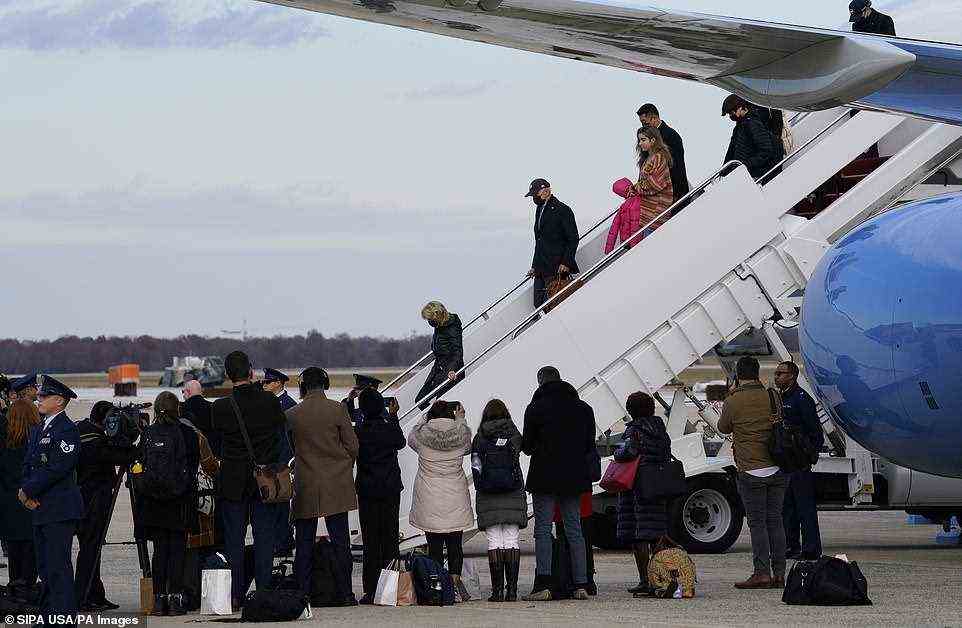
Upon his return to the capital Biden was asked whether he’d consider further travel restrictions besides those imposed on eight African countries over the new variant
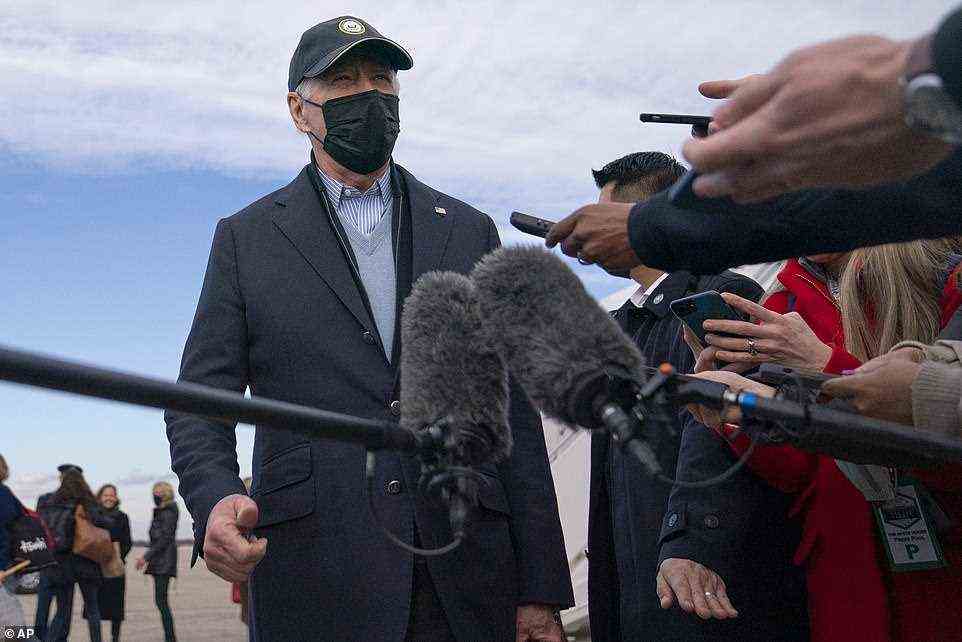
‘I’m having a meeting with my medical team as I get back to the White House. I’ll have more to say,’ he replied

‘I know that this new variant may seem concerning,’ he added, but then said existing vaccines and public health measures were helping to reduce the spread of COVID-19.
In a separate statement, the Public Health Agency of Canada said border measures could change as the situation develops.
‘The Government of Canada will continue to assess the evolving situation and adjust border measures as required,’ it said
Earlier on Sunday Fauci, the top public health expert in the U.S., warned that a fifth wave could still be coming.
‘The fifth wave, or the magnitude of any increase… will really be dependent upon what we do in the new few weeks to a couple months,’ Fauci said on CBS’s ‘Face the Nation’ today.
He urged Americans to get their booster shots, or their initial jabs if they had yet to get vaccinated – ‘if we do that successfully… we can mitigate any increase.’
His comments came as the South African doctor who first raised the alarm on the variant revealed that patients did not exhibit telltale symptoms such as loss of taste and smell after contracting the virus, but had high pulse rates, fatigue and muscle aches.
‘We all know when you have a virus that has already gone to multiple countries, inevitably it will be here,’ Fauci said on ABC’s This Week on Sunday.
‘It has a bunch of mutations,’ Fauci said, including, ‘a disturbingly large number of mutations in the spike protein, which is the business end of the virus.’
It is too early to tell whether lockdowns and mandates will be deployed again, he said, but ‘you want to be prepared to do anything and everything’ to mitigate a resurgence in infection rates.
On NBC’s ‘Meet the Press,’ Fauci said that there is a ‘strong indication’ that the new variant could be resistant to lab-made monoclonal antibodies and antibodies donated from those who have recovered from the virus and ‘possible against even some of the vaccine-induced antibodies.’
‘It’s clearly giving the indication it has the capability of transmitting rapidly,’ Fauci said. ‘That’s what’s causing us to be concerned.’
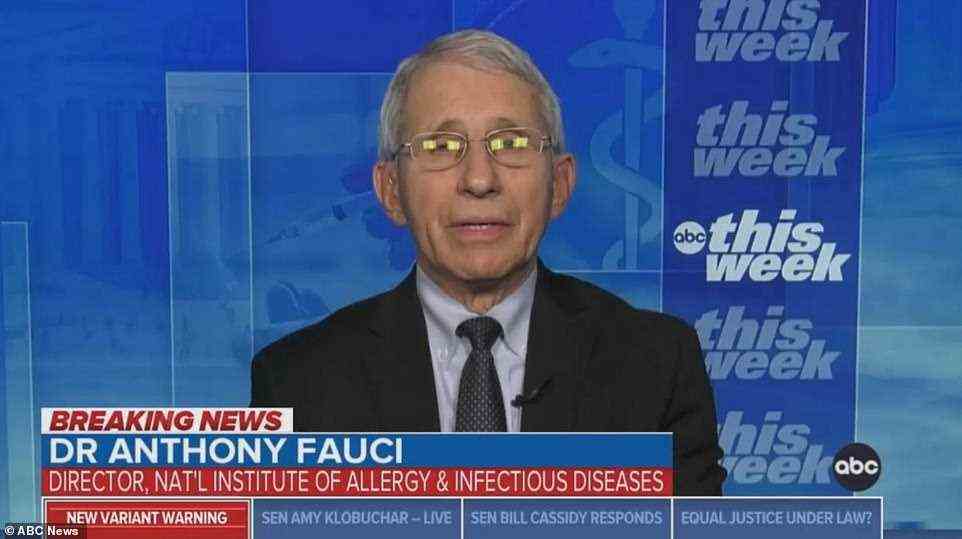
Dr. Anthony Fauci (pictured) said Sunday that the new strain of COVID, dubbed a ‘variant of concern’ last week by the World Health Organization (WHO), will ‘inevitably’ arrive
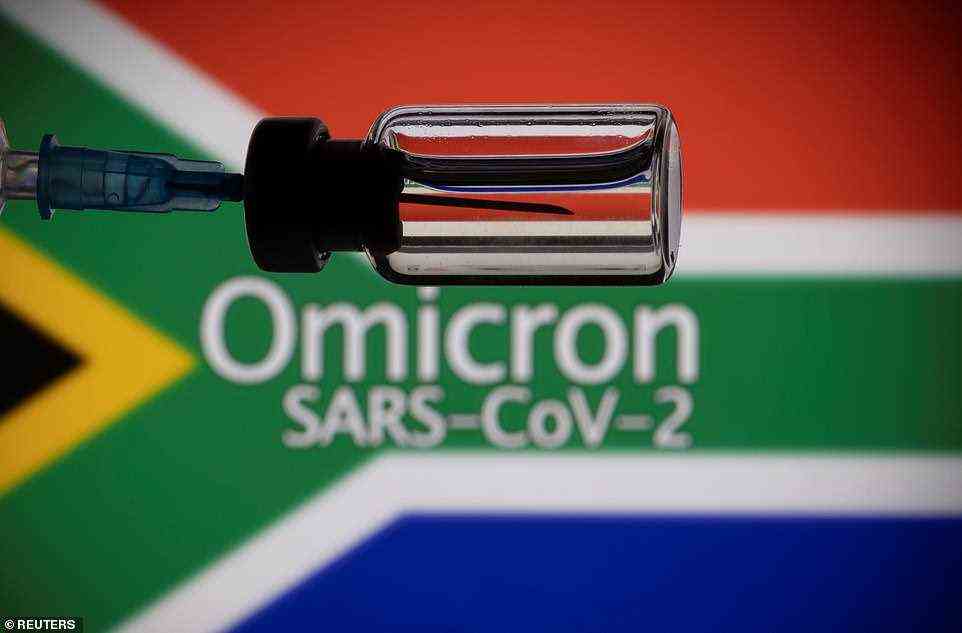
Scientists have said they are concerned about the B.1.1.529 variant, named by the World Health Organisation as Omicron, as it has around 30 different mutations – double the amount present in the Delta variant. It was first discovered in Botswana, then spread to South Africa earlier this month
Moderna’s Chief Medical Officer Paul Burton said on Sunday that their vaccine could be reformulated against the new variant, but the updated version won’t be available for another few months, until the beginning of 2022.
‘We should know about the ability of the current vaccine to provide protection in the next couple of weeks,’ he said on BBC’s Andrew Marr Show.
National Institute of Health Director Francis Collins said in an interview with ‘Fox News on Sunday’ that Omicron had an unprecedented number of mutations – ‘like 50 of them and more than 30 of those in the spike protein, which is the part of the virus that attaches to your human cells if you get infected.’
‘That is a new record in terms of the number of mutations,’ he said. ‘It does make you worry, therefore, that it’s a sufficiently different virus, that it might not respond as well to protection from the vaccines. But we don’t know that.’
The new strain of COVID was dubbed a ‘variant of concern’ last week by the World Health Organization (WHO).
Scott Gottlieb, the former head of the FDA, said today on ‘Face the Nation’ that the variant is ‘almost definitely’ already in America:
‘Just looking at the number of cases coming off planes this weekend, it’s almost a certainty that there some cases that have gotten into the United States.’
On Sunday, flight UA 187 from Johannesburg, South Africa landed at Newark Liberty International Airport ahead of the Biden administration’s travel ban, which went into effect on Monday.
Biden’s travel restrictions do not ban flights or apply to U.S. citizens and lawful U.S. permanent residents.
However, most non-residents who have been to Botswana, Lesotho, Malawi, Mozambique, Namibia, South Africa, Swaziland or Zimbabwe within the last 14 days will not be allowed to enter the country.
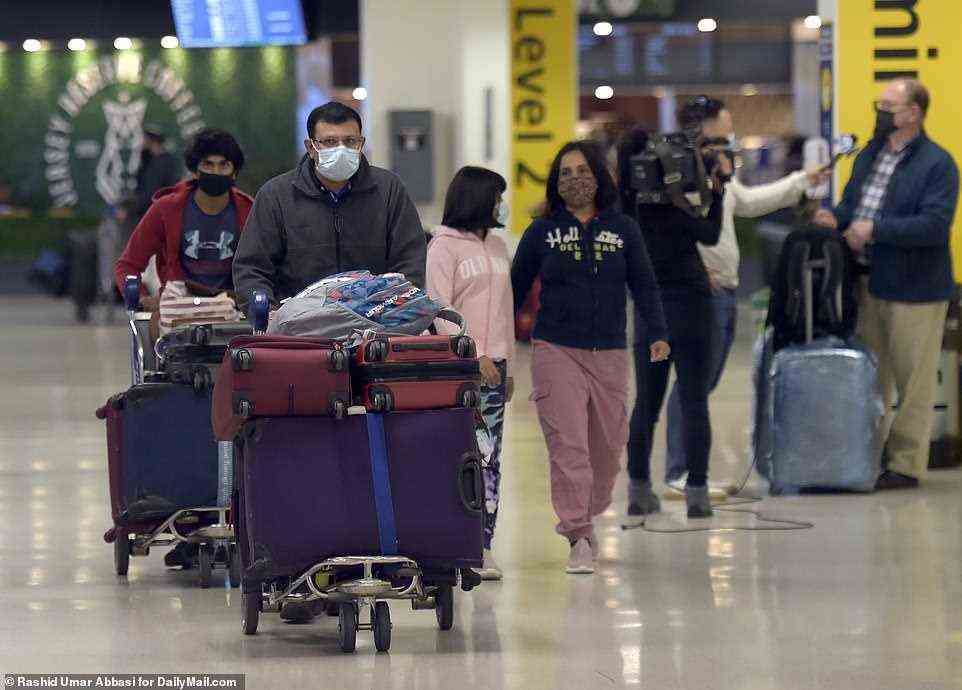
On Sunday a flight from Johannesburg, South Africa landed at Newark National Airport ahead of the ban, which will go into effect on Monday. Passengers from the flight are pictured disembarking
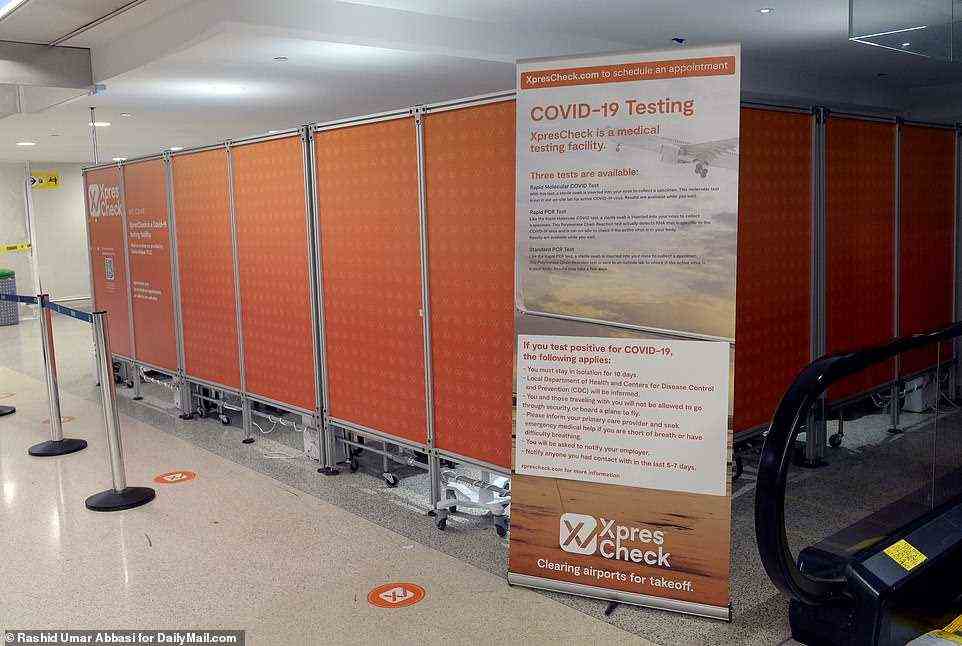
Pictured is a quick testing center at Newark Liberty International Airport
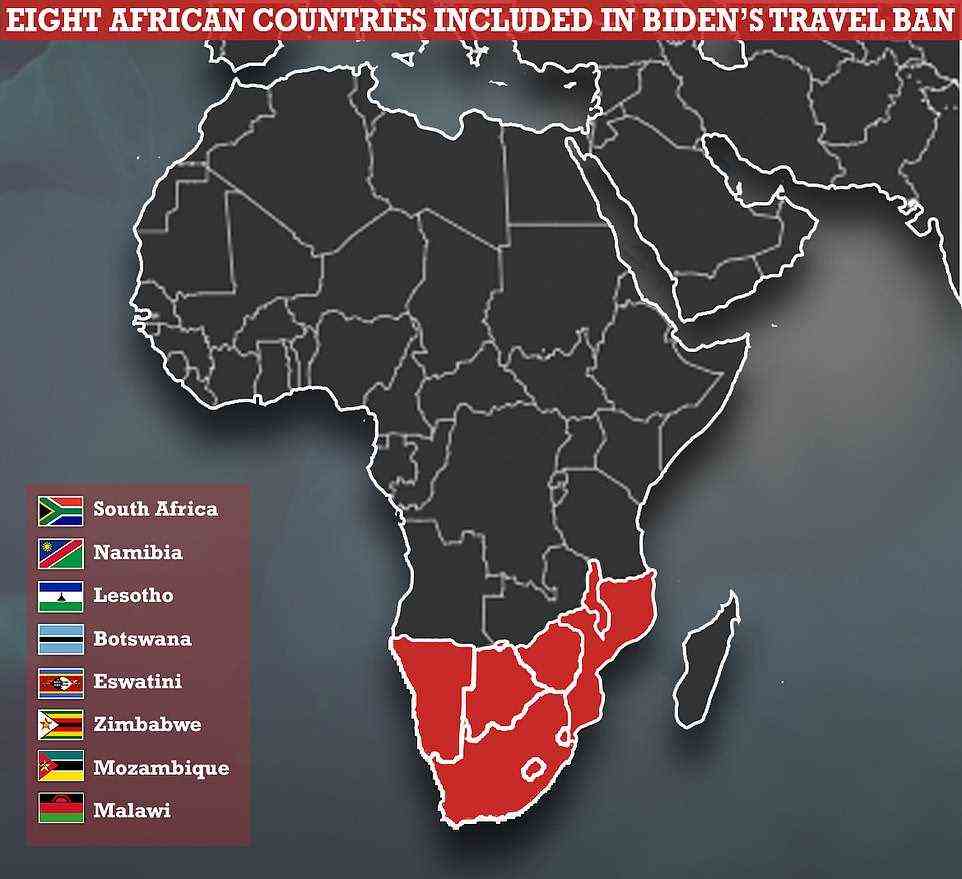
President Joe Biden’s travel restrictions do not ban flights or apply to U.S. citizens and lawful U.S. permanent residents. However, most non-residents who have been to Botswana, Lesotho, Malawi, Mozambique, Namibia, South Africa, Swaziland or Zimbabwe within the last 14 days will not be allowed to enter the country
Rattled by news of the variant, which experts say could be resistant to the COVID vaccine, the stock market had its worst trading day of 2021 for the blue-chip index on Friday.
Midday, the DOW plunged by more than 1,000 points, closing 2.5 percent lower at 34,899. S&P 500 dropped by 2.3 percent and closed at 4,594, its biggest drop since February, and the Nasdaq closed at 15,491, losing 2.2 percent of its value.
However, Gottlieb addressed fears that the new variant would reverse progress made since the pandemic began, revealing that the CDC will set up a surveillance system specifically for the omicron strain, and is sequencing 100,000 cases per week.
‘We’re in a much better place than we were a year ago when B.1.1.7 first arrived or when delta first arrived,’ he said.
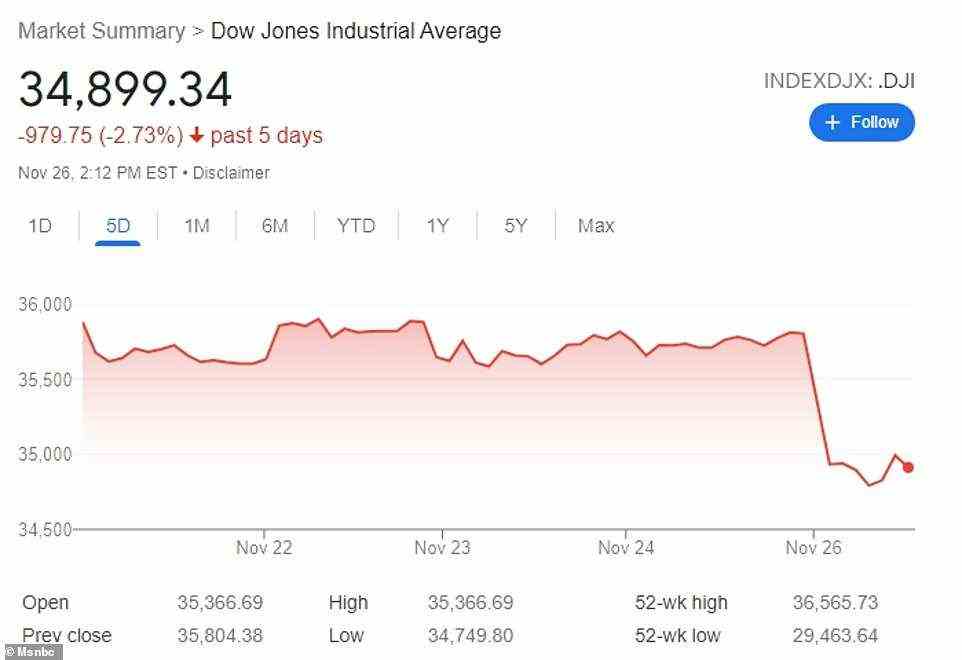
Rattled by news of the variant, which experts say could be resistant to the COVID vaccine, the stock market had its worst trading day of 2021 for the blue-chip index on Friday.
The variant was first detected in South Africa by Dr Angelique Coetzee, who runs a private practice in the South African administrative capital of Pretoria, said she first noticed earlier this month that COVID patients were presenting with a host of odd symptoms.
The doctor, who has practiced for over 30 years and chairs the South African Medical Association, said that none of the Omicron patients suffered from a loss of taste of smell typically associated with COVID, but instead presented with unusual markers like intense fatigue and a high pulse rate.
‘Their symptoms were so different and so mild from those I had treated before,’ Dr Coetzee told The Telegraph.
She was compelled to inform South Africa’s vaccine advisory board on November 18 when she treated a family of four, all of whom were suffering with intense fatigue after testing positive for COVID-19.
Dr Coetzee reassured the media that the new symptoms she had observed were ‘mild’, and that all of the patients she was treating had recovered well.
‘We had one very interesting case, a kid, about six years old, with a temperature and a very high pulse rate, and I wondered if I should admit her,’ Dr Coetzee said,
‘When I followed up two days later, she was so much better.’
But the doctor also said she was worried the variant could pose a greater danger to the elderly.
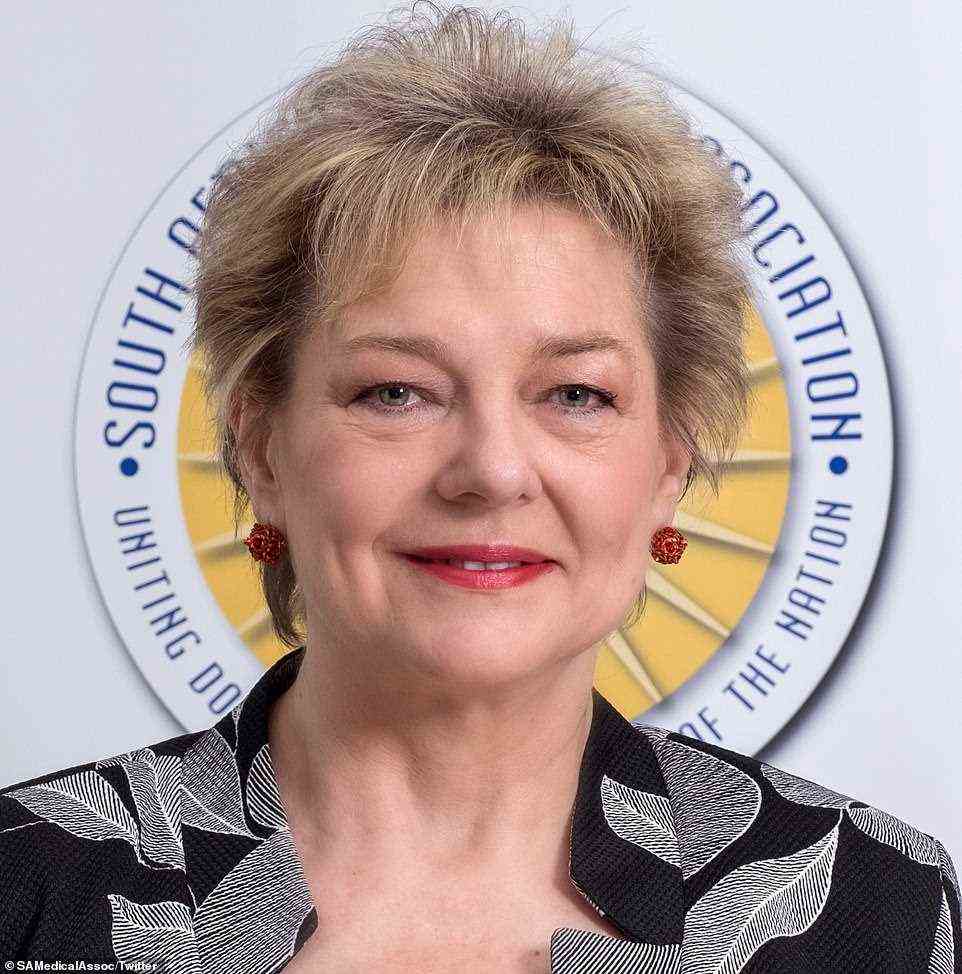
Dr. Angelique Coetzee. The South African doctor who first alerted authorities to the presence of the COVID-19 omicron variant reported that it presents ‘unusual but mild’ symptoms. Dr. Coetzee, a board member of the South African Medical Association, first noticed otherwise healthy patients demonstrating unusual symptoms on Nov. 18
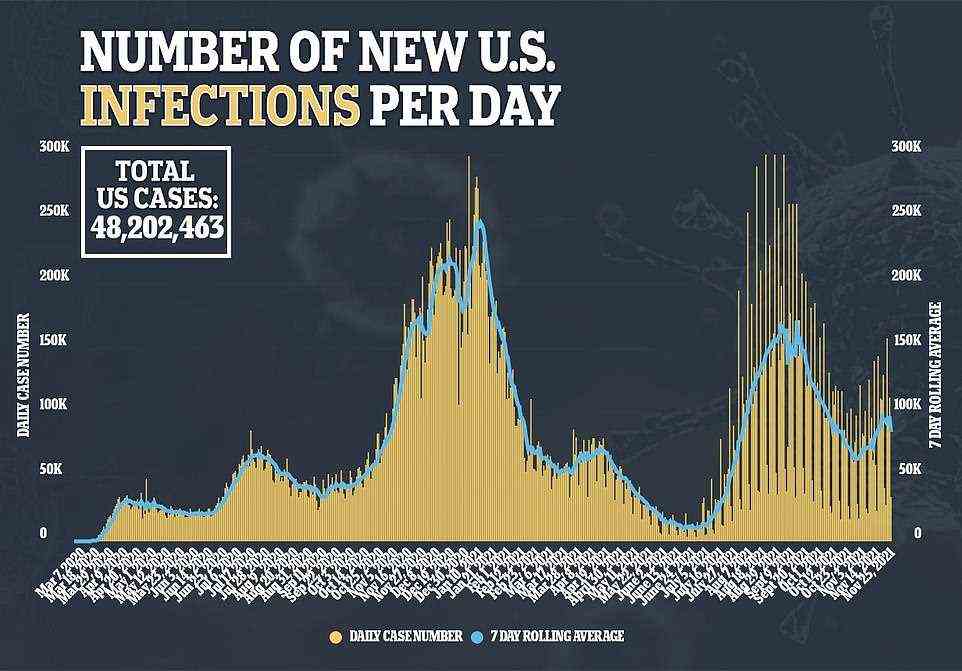
COVID-19 has infected 48,202,463 people since March of 2020. No cases of the new Omicron variant have been detected within the country
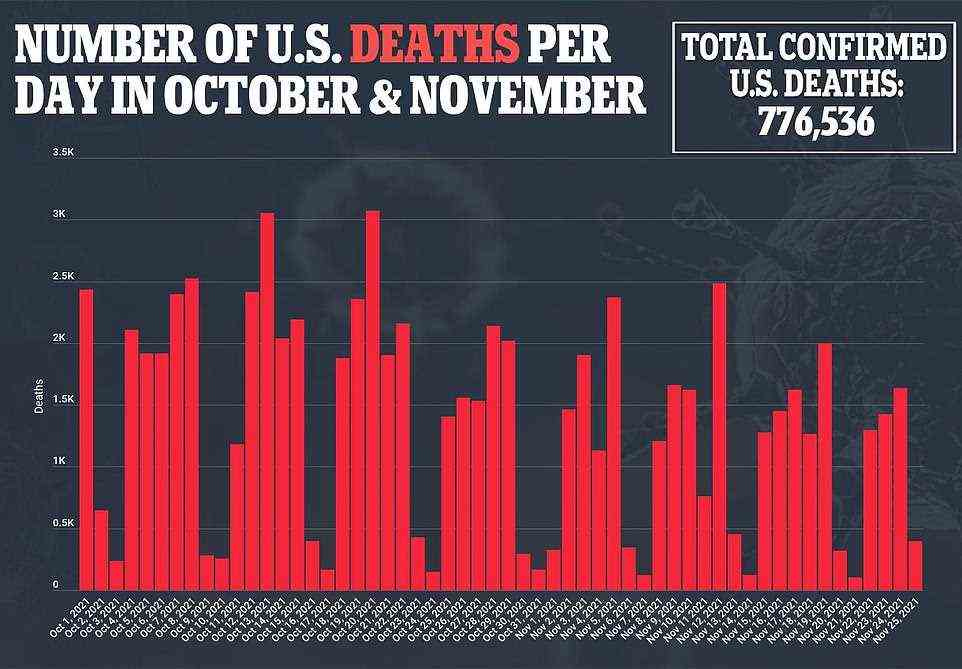
The coronavirus has killed 776,536 people in the US since March of 2020
On Friday, New York Governor Kathy Hochul issued a COVID-19 ‘disaster emergency’ declaration, citing increasing rates of infections and hospitalizations. She did not reference the Omicron variant.
The United States only lifted the travel curbs on 33 countries including South Africa, China, much of Europe, India, Brazil, Ireland, Britain and Iran on November 8, after blocking the entry of most foreign nationals who had recently been in those countries since beginning in early 2020.
As of Sunday, confirmed and suspected COVID-19 cases caused by the new variant have been detected in a growing number of regions, including Britain, Belgium, Botswana, Germany, Italy, Hong Kong, Israel and the Czech Republic – and now Canada.
The majority of those infected had recently traveled to affected African countries, according to the Washington Post.
Austria also joined the growing list of countries where the variant has been reported, detecting its first suspected case of the new variant in the Tirol region, Reuters reported Sunday, citing Austrian officials.
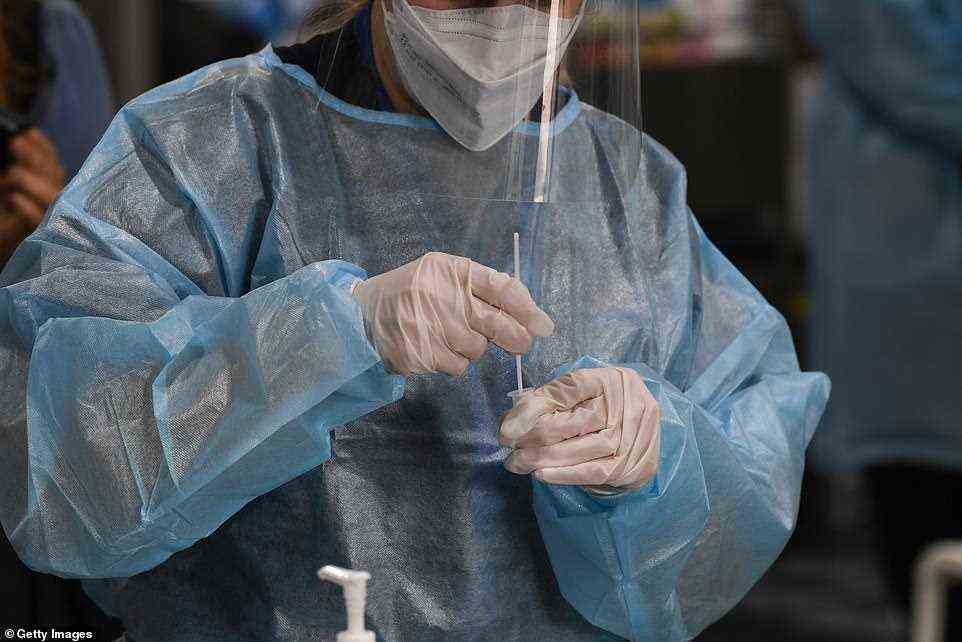
A health staff member prepares a COVID-19 test at Sydney International Airport on November 28, 2021 in Sydney, Australia. NSW Health authorities will now send people who have been overseas in the two weeks before their arrival into three days of home quarantine, as the state works out its response to the threat posed by a new, ‘concerning’ variant of COVID-19 named Omicron
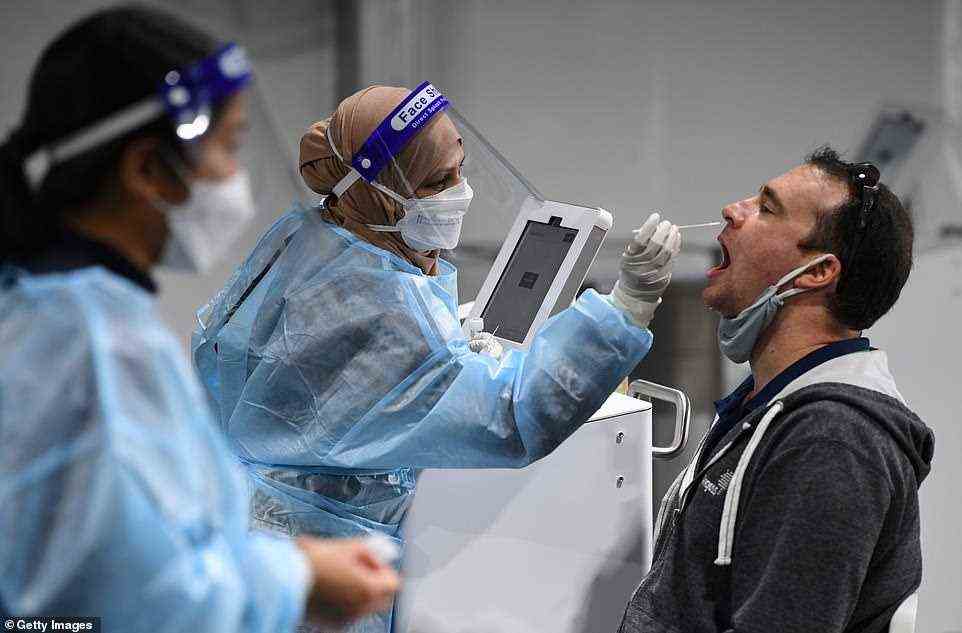
Omicron is potentially more contagious than previous variants, although experts do not yet know if it will cause more or less severe Covid-19 compared to other strains (a man undergoes a Covid test in Sydney International Airport this morning)
When asked whether this new variant of COVID was ‘more severe’ than its predecessors, Fauci said that US scientists met with counterparts in South Africa on Friday and plan to do so again on Sunday ‘to try and find out of the cases they have identified that clearly are caused by this variant, what is the level of severity in that.’
‘Hopefully, it will be light,’ he said.
Biden called on nations meeting at the World Trade Organization next week to waive intellectual property (IP) protections for COVID-19 vaccines in the wake of the new variant.
‘The news about this new variant should make clearer than ever why this pandemic will not end until we have global vaccinations,’ Biden said in a statement.
However, the WTO meeting was postponed because concerns about the variant, sources told Reuters, potentially making the already slow and uncertain process of intellectual property waivers even more so.
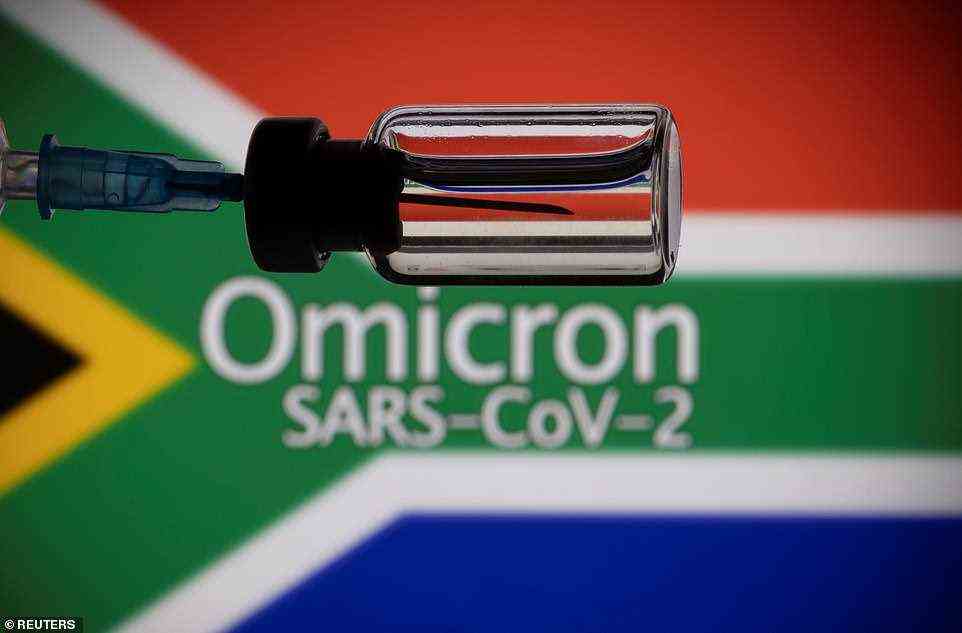
Scientists have said they are concerned about the B.1.1.529 variant, named by the World Health Organisation as Omicron, as it has around 30 different mutations – double the amount present in the Delta variant. It was first discovered in South Africa earlier this month
The discovery of the new variant has prompted several other countries to reinforce COVID restrictions and impose stringent border controls in an attempt to contain the spread.
British Prime Minister Boris Johnson on Saturday imposed isolation for all UK arrivals pending PCR test results and mandatory masks in shops and on trains, and placed a host of countries on the ‘red list’ for travel restrictions.
Switzerland has said that only Swiss nationals and permanent residents can enter, but a pre-departure negative test must be proven alongside a 10-day mandatory quarantine.
Spain has also announced a ban on unvaccinated Britons after neighbor Portugal said it would demand proof of a negative coronavirus test to let even the double-jabbed enter the country.
Health authorities in Australia’s New South Wales, meanwhile, will send people who have been overseas in the two weeks before their arrival into three days of home quarantine, after two fully-vaccinated, asymptomatic passengers from southern Africa flying into Sydney from Doha, Qatar on Saturday evening tested positive for the variant.
Nicole A. Errett, a professor at the University of Washington who has done research on public health emergency preparedness, told the Washington Post that the travel ban was probably issued too late to stop the variant from reaching the US.
‘By the time we have enough information to institute a travel ban, the cat’s already out of the bag, so to speak,’ Errett said.
‘Omicron has already been detected in other continents.
‘A travel ban could in theory buy some time by reducing the spread of new seed cases, but we are talking on the order of days to weeks.’
Fauci admitted on ‘Meet the Press’ that we ‘certainly are not going to eradicate’ COVID-19 entirely on the broadcast, but will hopefully ‘get a level of control that’s low enough that doesn’t interfere with our function.’
‘It doesn’t have a major impact on society and what we do, but it’s not going to go away.’


